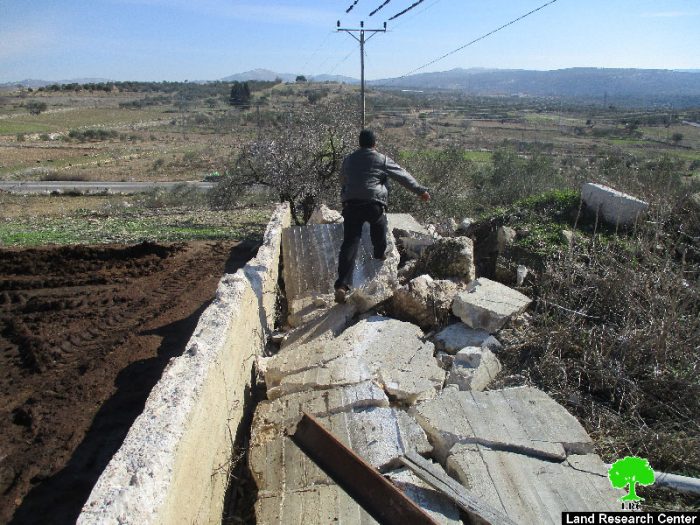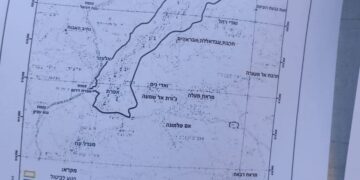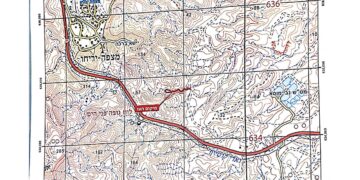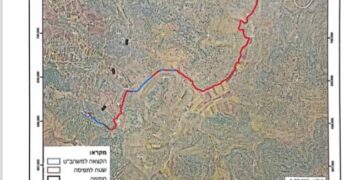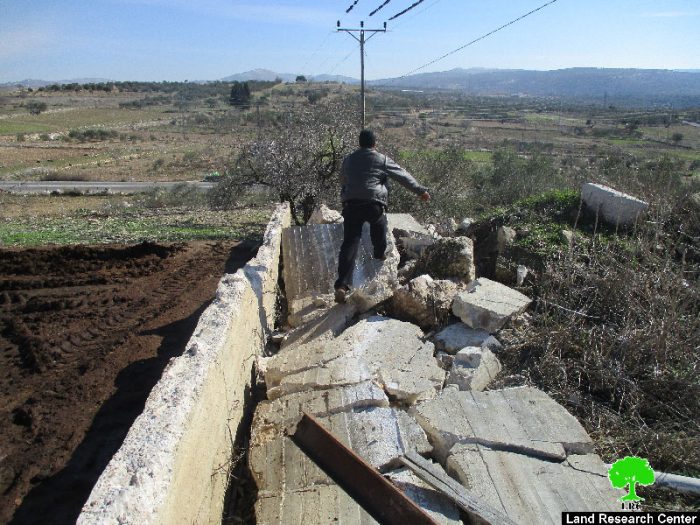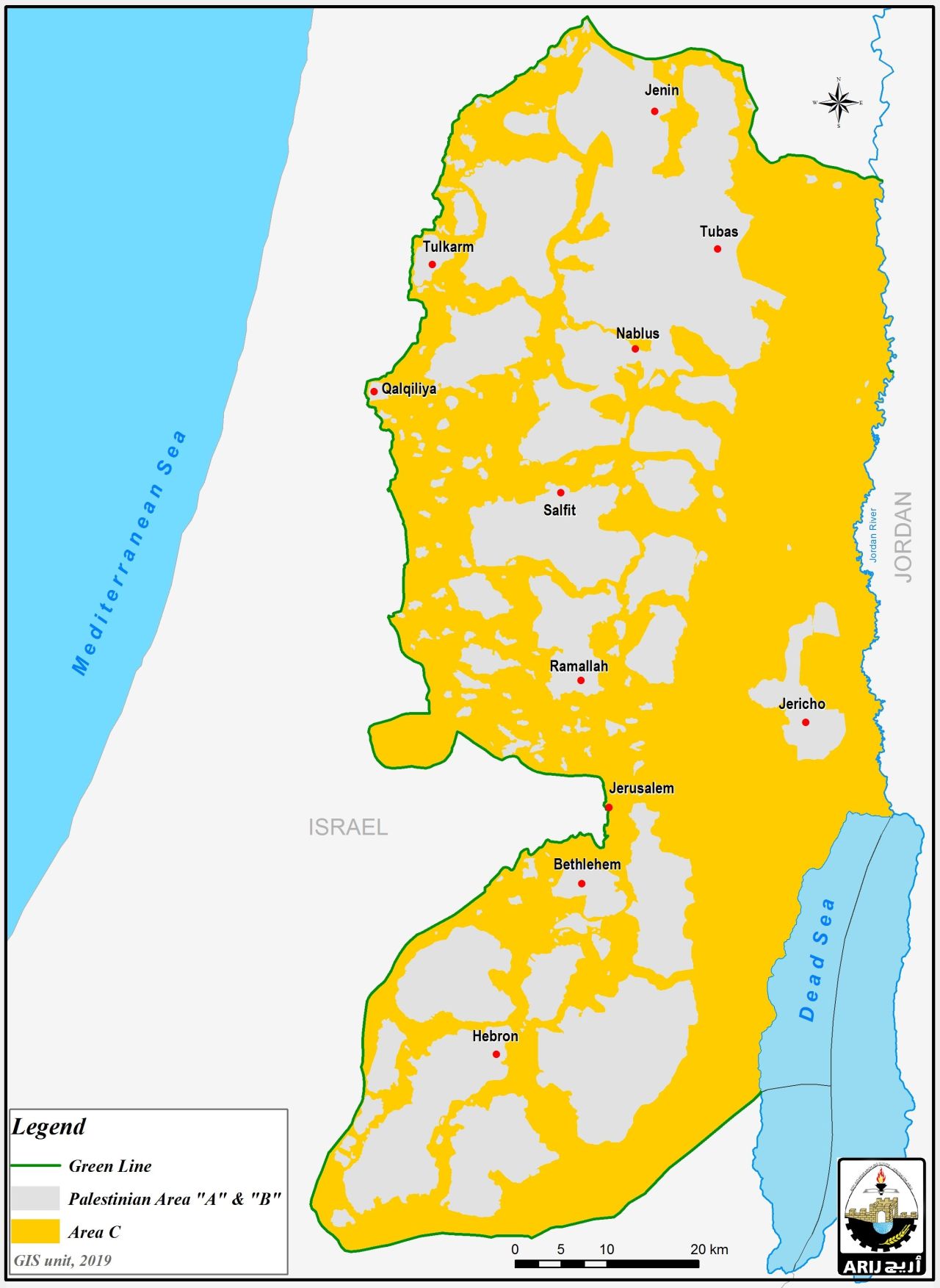- Violation: demolition and threats of demolition
- Location: Jeinsafout village- Qalqiliya governorate
- Date: January 3- 5, 2017
- Perpetrators: Planning and Construction Committee- Israel Civil Administration
- Victims: ten Palestinian families
Details:
A massive force from Israeli Occupation Army accompanied by the so-called Planning and Construction Committee- Israel Civil Administration and a military dozer raided the village of Jeinsafout from the eastern side and imposed a curfew. Minutes later, the force embarked on demolishing a farm for livestock on the claim of it being unlicensed. It should be noted that the farm is built by cement blocks and roofed with metal slaps. The 360m2 structure was established by the beginning of 2016. The affected owner rebuilt his farm on the rubbles of the demolished one. By the beginning of the current year, he received a demolition order based on another demolition order issued in 2015. The following table shows information about the affected owners and their property:
|
Affected owner |
No. of affected families |
No. of members |
Minors |
No. of sheep |
Nature of damage |
Remarks |
|
Abdelfattah Basheer and his four sons ( Sa'd, Raheed, Fahid and Mirshid) |
Five families |
23 |
7 |
400 |
Demolition of 180m2 barrack Demolition of four feeders and 13 meters retaining walls |
Had structures demolished before |
A threat of demolition on sheep farm:
It should be marked that the occupation forces delivered farmer Majid Sukkar a demolition threat on his sheep farm that is also founded in Jeinsafout village. According to the order number 203597, the affected owner was given a seven day deadline to evacuate the far.
Noteworthy, the farm is considered a source of income for the owner's family and his son's family, comprising of 11 member including children. It was built in 2013 and it is of 150m2 in area. Now, the farm shelters 150 sheep.
In September 27, 2016 the farm was served a stop-work order. At time, the legal file needed for objection in Israeli court. Despite all efforts, the Israeli occupation did not grant the owner the needed license.
Photo 7: the military order
About Jeinsafout:
16.938 km to southeast Qalqilya, Jeinsafout is located with a population of 2,119 people and a total area of 8,659dunums, 218 of which are built-up area. al-Funduq and Hejih towns are there from the north and Emmanuel colony from the south. As from the west, there are Kfar laqif town and the two colonies of Karmi Shomron and Navi Manhim. Part of Emmanuel colony and the towns of Fra’ta and Amatin are there from the east.
Jeinsafout went through a series of colonial assaults that affected its unique geo-political situation. Lands confiscation under the pretext of military purposes that ended up as new outpost and bypass roads, was the method by which the colonial plan was implemented.
The village is surrounded by a number of colonies such like Ammuneil, Karni Shomron,, Nevi Oranium and outposts suck like Nevi Menahim and Ramot Jil’ad. The chairman of the village council to the LRC observer said that the aforementioned colonies and outposts have been controlling more than 40% of the village total land area and that has been a hindrance of developmental plans for Jeinsafout.
Land Research Center LRC sees that demolitions contradict with all of the International conventions and Humanitarian laws including:
- Article 17 of the (1948) Universal Declaration of Human Rights stating: “Everyone has the right to own property alone as well as in association with others. No one shall be arbitrarily deprived of his property.”
- Section ‹G› of article 23 of the (1907) The Hague Conventions asserting: “In addition to the prohibitions provided by special Conventions, it is especially forbidden to destroy or seize the enemy's property, unless such destruction or seizure be imperatively demanded by the necessities of war.”
- Article 53 of the Geneva Fourth Convention (1948) declaring: “Any destruction by the Occupying Power of real or personal property belonging individually or collectively to private persons, or to the State, or to other public authorities, or to social or cooperative organizations, is prohibited, except where such destruction is rendered absolutely necessary by military operations.”
- Section 1, Article 11 of the International Covenant on Economic, Social and Cultural Rights (1966): “The States Parties to the present Covenant recognize the right of everyone to an adequate standard of living for himself and his family, including adequate food, clothing and housing, and to the continuous improvement of living conditions. The States Parties will take appropriate steps to ensure the realization of this right, recognizing to this effect the essential importance of international co-operation based on free consent."
Prepared by
The Land Research Center
LRC

